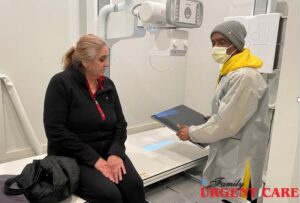According to the Centers for Disease Control & Prevention (CDC), 6 in 10 adults in the US suffer from several chronic diseases like heart disease, cancer, diabetes, hypertension and much more.
Various other studies and institutions report an increase in chronic disease from the past two decades in the US and is expected to continue in the future.
Amidst the rising prevalence in the US, understanding their impact and taking preventive measures is necessary.
Therefore, in this blog, you’ll explore some common chronic diseases prevalent in the US, their common symptoms, and how they can affect people’s lives. Not to mention, you’ll also learn some steps to avoid chronic illnesses.
Six Most Common Chronic Diseases in the US
As stated by the CDC, here we have summarized the six top chronic diseases that are on the rise.
1. Cardiovascular Diseases
In the United States, heart disease has been one of the leading causes of death since 1950. A persistent increase in the number of cases every year is due to several risk factors such as high blood pressure, high bad cholesterol (LDL), diabetes, smoking, unhealthy diet and obesity.
These risk factors contribute to a wide range of cardiovascular diseases such as heart attack, arrhythmias, heart valve disorders, unstable angina and much more.
One of the most common issues is heart attack in which the heart muscle that has lost the blood supply begins to suffer an injury due to lack of oxygenation. As a result, the heart muscle becomes damaged which leads to serious consequences.
2. Cancer
Cancer is the second-most common cause of death in the U.S. It is caused when abnormal cells divide without any control and spread into other tissues in the body. This process is also known as metastasis.
The most common types of cancer in the US are breast cancer, lung cancer, prostate cancer, colorectal cancer, bladder cancer, non-Hodgkin’s lymphoma, etc.
If cancer is diagnosed at an early stage, it can be treated successfully and therefore, many lives can be saved. So, it’s important to tell your doctor as soon as you notice any concerning symptoms, such as weight loss, persistent tiredness, pain, fever, skin changes, or any other abnormal symptoms.
Once you know your symptoms, you can easily take some steps towards early detection and treatment, potentially reducing the spread of cancer to other body parts.
3. Diabetes
It is the most common disease in which the body cannot manage blood sugar levels properly. If the sugar levels are not maintained, it can cause other health conditions like nerve damage, kidney disease, heart disease, eye damage and much more.
However, with proper diagnosis, treatment and care, it can be managed successfully. Therefore, it is important to go for regular health check-ups to avoid further complications.
The two most common types of diabetes that occur in many individuals are:
- Type-1 Diabetes: In type 1 diabetes, your body cannot make insulin due to the autoimmune destruction of the insulin-producing cells in the pancreas. This occurs when your immune system attacks and destroys the cells in your pancreas.
- Type-2 Diabetes: mostly occurs due to inadequate insulin secretion and when insulin-sensitive cells cannot respond to insulin secretions. Improving your lifestyle can give great results and reduce the chances of diseases like heart and kidney damage.
4. Hypertension
Hypertension occurs when the blood pushed against the artery walls with a higher force. This extra strain can harm the blood vessels, raising the risk of several heart diseases.
Blood pressure is measured with systolic pressure (the top number) when the heart beats, and diastolic pressure (the bottom number) when the heart relaxes.
There are two common types of hypertension: Primary and Secondary.
- Primary hypertension often develops gradually without an identifiable cause, it is thought to result from a combination of genetic, lifestyle, and environmental factors.
- Secondary hypertension has a specific cause or condition that leads to elevated blood pressure. Various medical conditions and factors, including kidney disease and hormonal disorders, can contribute to secondary hypertension.
Risk factors include age, family history, obesity, unhealthy lifestyle habits, and certain chronic diseases. Hypertension can damage your arteries over time and can increase the risk of heart attacks and strokes.
5. Asthma
More than 27 million people in the US suffer from asthma, in which the airways become narrow and swollen, causing difficulty in breathing. The inflammatory response in asthma is triggered by exposure to certain stimuli, such as allergens, pollen, and dust mites.
During an asthma attack, people mostly experience symptoms such as:
- Wheezing (high-pitched whistling sound from the chest during breathing)
- Shortness of breath
- Chest tightness or pain and discomfort
- Unable to sleep due to difficulty in breathing or chest tightness
However, the symptoms might vary from person to person, depending upon the type of asthma a person has and overall health.
6. Arthritis
In a recent study in 2021, the researchers reported that almost 53.2 million people above age 18 have been diagnosed with arthritis.
Arthritis is defined as the inflammation in the joints characterized by pain, swelling, stiffness and limited movement. Although it can affect any age group, however, it is more common in people between 40 and 60.
Some type of arthritis include osteoarthritis, gout, psoriatic arthritis, rheumatoid arthritis and childhood arthritis.
4 Handy Tips to Avoid Chronic Illness
It is possible to prevent chronic illnesses by adopting healthy lifestyle habits, such as
1. Go For Regular Health Check-ups
Regular health checkups are crucial in preventing chronic illnesses as healthcare providers can monitor key health indicators like blood pressure, cholesterol, thyroid levels, blood sugar levels and much more.
The doctor can detect abnormalities or assess risk factors which enables timely interventions such as lifestyle modifications, medications or preventive screenings.
2. Eat a Healthy & Balanced Diet
Eating a healthy diet prevents chronic illnesses as it provides essential nutrients to strengthen your bodily functions. You can plan your diet and consume different fruits, vegetables, whole grains and lean proteins.
If you have risk factors for a certain disease, lifestyle changes like a balanced diet can help manage body weight, blood sugar levels and cholesterol levels.
3. Avoid Smoking and Alcohol
People who smoke frequently or drink alcohol too often are at a higher risk of chronic illnesses in the future because of their negative impact on the body.
It increases the risk of respiratory issues like asthma and bronchitis and also lead the lung cancer in later age.
Similarly, excessive alcohol use can effect liver function and lead to alcoholic liver disease, cirrhosis and liver cancer. Not to mention, people become more prone to digestive disorders and mental health issues if they do not limit alcohol consumption.
4. Regular Exercise For 30 Minutes At Least
Physical exercise is highly crucial for maintaining a healthy life and reducing the risk of chronic diseases in your later age. It not only strengthens your muscles but also boosts immune function, reducing the likelihood of infections and chronic inflammatory conditions.
So, even if you’re a noob and don’t exercise regularly, you can start off with walking or jogging daily for 30 minutes.
Expert Chronic Disease Management at Family Urgent Care
Whether you’re looking for an annual check-up or perhaps you or your family member need appropriate treatment and care for any chronic disease.
We are here to provide the right guidance and consultation regarding a wide range of chronic diseases like hypertension, asthma, arthritis, diabetes and cardiovascular diseases.
With our advanced lab testing facilities and trusted healthcare providers, you can manage chronic diseases effectively.
So, are you ready to take control of your health? Don’t let chronic illness hold you back! Schedule your appointment today and connect to experienced doctors at Family Urgent Care.


























